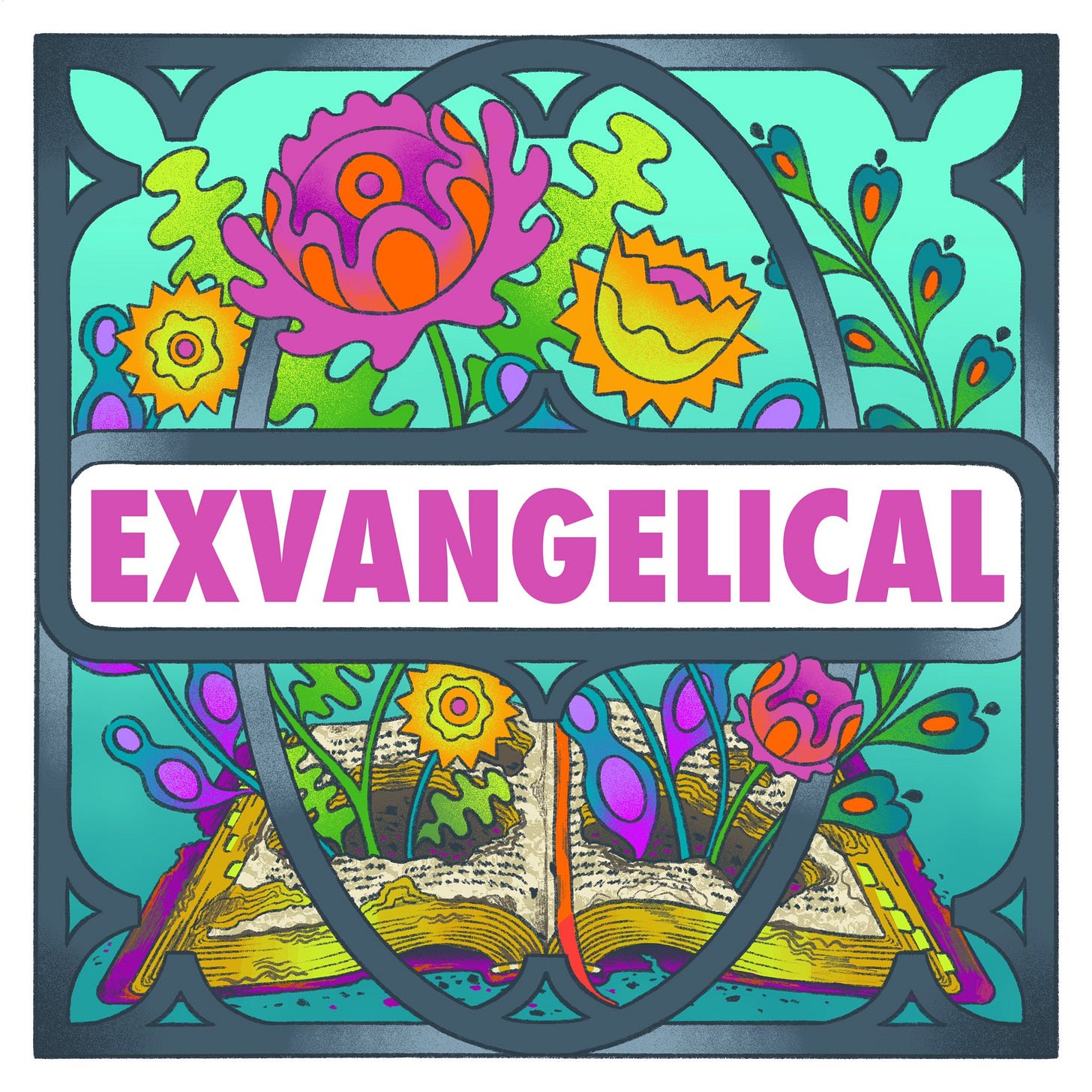6 years ago today, I published the first teaser episode of Exvangelical.
Since then, I’ve had the opportunity to speak to so many people who have left white-evangelicalism on the show, online, and in-person. At this time of year, I’m always filled with immense gratitude for whatever small part I’ve been able to have in adding to the conversation that has been going on for decades. Producing the show has not always been easy, but it has been meaningful.
The process we now commonly call "deconstruction" can be isolating, and I'm glad that we now have tools like social media to share our stories and make connections. Stories that used to be limited by things like the book market (Marlene Winell's foundational book Leaving the Fold was published in the early 90s, and dozens of other books about leaving evangelicalism have been published since), or contained to whisper networks of those who left toxic churches, can now be shared widely on platforms like Instagram, or shared more privately in groups across the internet.
Depending on your perspective and experience online, the term “exvangelical” may be loaded. Which is fine. Its use spread after the 2016 election, and the hashtag continues to find use across various social networks (as of this writing it has over 900M views on TikTok). The ad-hoc communities and cultures that have sprung up are not immune to the various pitfalls of social-media mediated interactions.
No matter how you relate to a term like "exvangelical" day to day, I hope that the conversations I’ve shared on the podcast have helped you feel less isolated, that they have helped you expand your view of your self and others, and sometimes just laughed or cried with others who understand what it's like to lose a faith & community of origin.
This has always been a labor of love. But it is labor all the same. I make it because I am compelled to; for better or worse, it is through white evangelical Christianity that I found my entry point into the world, of understanding both myself and the wider world I inhabit.
My New Testament professor, Dr. Kenneth Schenck, once passed on a metaphor from one of his own teachers, who asked their class to describe what they saw when we looked out a window. They would describe the scene on the other side of the window - the cars, the trees, the sidewalks - but very few if any would say “I see glass.”
Dr. Schenck then remixed this metaphor, saying that our first “worldview” (to use a Christianese term) that we inherit from our family is similar to the physical vision we inherit from them—it may not be perfect, and can require correction through lenses. That is one way I approach this work - it is corrective, and by correcting my own vision, I develop a greater appreciation and awe of the world that surrounds me.
Still, acclimating to adjusted senses can be quite literally disorienting. This spring, I had surgery to address a lifelong hearing issue. Until recently, I had never heard the world in stereo because my right ear-drum had been ruptured for most of my life. Multiple surgical attempts during my adolescence failed to fix the problem; this last surgery finally proved successful. Over the last four months, the depth of my hearing has increased - but it has happened slowly and sometimes painfully, as various forms of packing around the newly-healed ear drum wore away.
“Deconstruction” is similar. Whatever the catalyst may be—learning biblical scholarship that makes inerrancy untenable, finding hermeneutics that dismantle complementarian and homophobic interpretations of scripture, unearthing the ways white Christianity is complicit in colonialism and white supremacy, or any other reason—it is both uncomfortable and expansive.
Starting (and continuing) this podcast and expanding the work here through this newsletter & website is a continuation of the same pursuit I started 20 years ago as an undergrad at Indiana Wesleyan intent on becoming a pastor. I want to make sense of my world, to mitigate harm, and to live well. I pursued my paths of inquiry, learned white evangelical history and theology, repudiated it, and sought new paths. I am still seeking those paths, as are many others.
In 2020, I debuted new podcast artwork I commissioned from the artist Jenna Luecke. I gave her a simple prompt: a design that would explore the idea of something dying away so something new can grow. And what Jenna came up with surpassed my wildest expectations.1
This image, of all manner of flowers and plants growing from a Bible, expresses the various ways that those of us who’ve left white evangelicalism have found our own distinct ways to flourish. We may all have been rooted in similar experiences, but find our own expression of new growth. And that diversity is beautiful. Jenna captured that beautifully.
Wholeness > Holiness.
Thanks so much for listening and reading.
I am an independent podcaster and writer. I make it because I am compelled to, and I am compelled to ask for support so that I can make even more.
I’d love to expand my work and dedicate more time to podcasting and writing. Direct support is the most viable way for me to do this, and a key reason why I started this Substack.
Be sure to subscribe, at $4, $6, or $8/month to receive ad-free podcast feeds & more. I donate 25% of net proceeds to White Homework & The Religious Exemption Accountability Project. Free tiers are also available.






